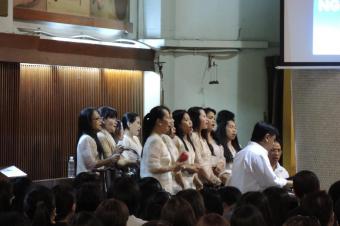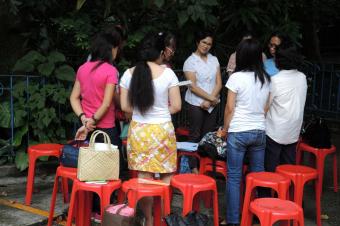Some 144,000 Filipina women work in Hong Kong,1 mainly as “helpers,” doing domestic work and childcare in the homes of middle class and wealthy Hong Kong Chinese and expatriates.2 They sign two-year contracts with their employers and are paid a salary of HK $4,000 (about US $500) a month. While they are supposed to be provided with their own quarters, many have to share a room with the child or children they are raising, or live in crowded boarding houses. Some younger, unmarried women come for a sense of opportunity and adventure, but most women experience some sort of family or employment crisis that impelled them to move to Hong Kong. They can earn better salaries as house help in Hong Kong, even though they often had decent, clerical-level jobs in the Philippines. Their earnings are almost all sent home to pay for children’s school fees or to care for parents and other family members. Many of the helpers spend a dozen or more years away from their children, leaving them in the care of relatives, and have the opportunity to visit home only every two years or less. These women speak of sacrifices that parents made for them, and see their work as an investment in their children’s futures. Workdays begin before breakfast, end after dinner and when children are in bed, and run 6 days a week.3
The Diocese of Hong Kong estimates that 120,000 of the Filipinos in Hong Kong are Catholic, meaning that they constitute one third of the Catholic population of in Hong Kong. While that presence may be changing Hong Kong Catholicism (Filipino clergy report that it took Hong Kong Catholics some time to learn how to acclimate to a “noisy group in the afternoon that takes over” their parish), this research focuses on how Filipino religious practice is reshaped by life in Hong Kong. 4
Read more
Gemma Tulud Cruz, "It Cuts Both Ways: Religion and Filipina Domestic Workers in Hong Kong," in Gender, Religion and Migration, eds. Glenda Tibe Bonifacio and Vivienne S.M. Angeles (Lanham: Lexington, 2010),17-36.
Nicole Constable, ed., Maid to Order in Hong Kong: Stories of Migrant Workers, 2nd edition (Ithaca, NY: Cornell University Press, 2007).
- 1 Hong Kong Catholic Social Communications Office, "Statistics of the Diocese of Hong Kong - Catholic Diocese of Hong Kong," Statistics of the Diocese of Hong Kong As On August 31, 2011, accessed August 29, 2013, http://www.catholic.org.hk/v2/en/cdhk/a08statistics.html.
- 2 In addition to the house help written about here, there are as many as 20,000 middle class Filipinos in Hong Kong who also work in professional fields.
- 3The information on Filipinas in Hong Kong derives from interviews and visits with Filipina Catholics conducted over a one-week period in June 2013. The interviews included 12 interviews arranged with the help of one Filipina househelper, and interviews with Filipina clergy and religious, and several women whom they recommended.
- 4A more extended description of Filipina domestic workers’ lives can be found in Caroline Knowles, and Douglas A. Harper, "Service," In Hong Kong: Migrant Lives, Landscapes, and Journeys, (Chicago: University of Chicago Press, 2009), 154-177.



